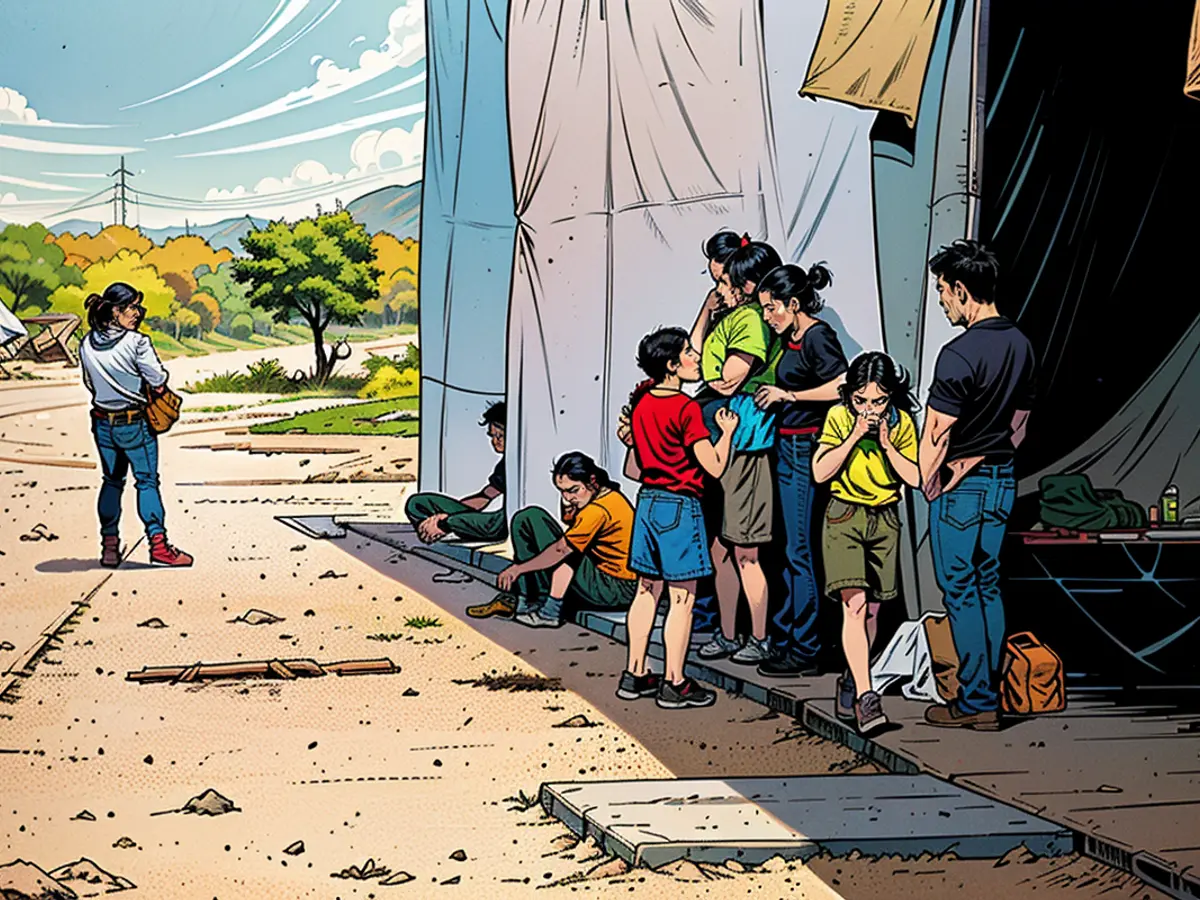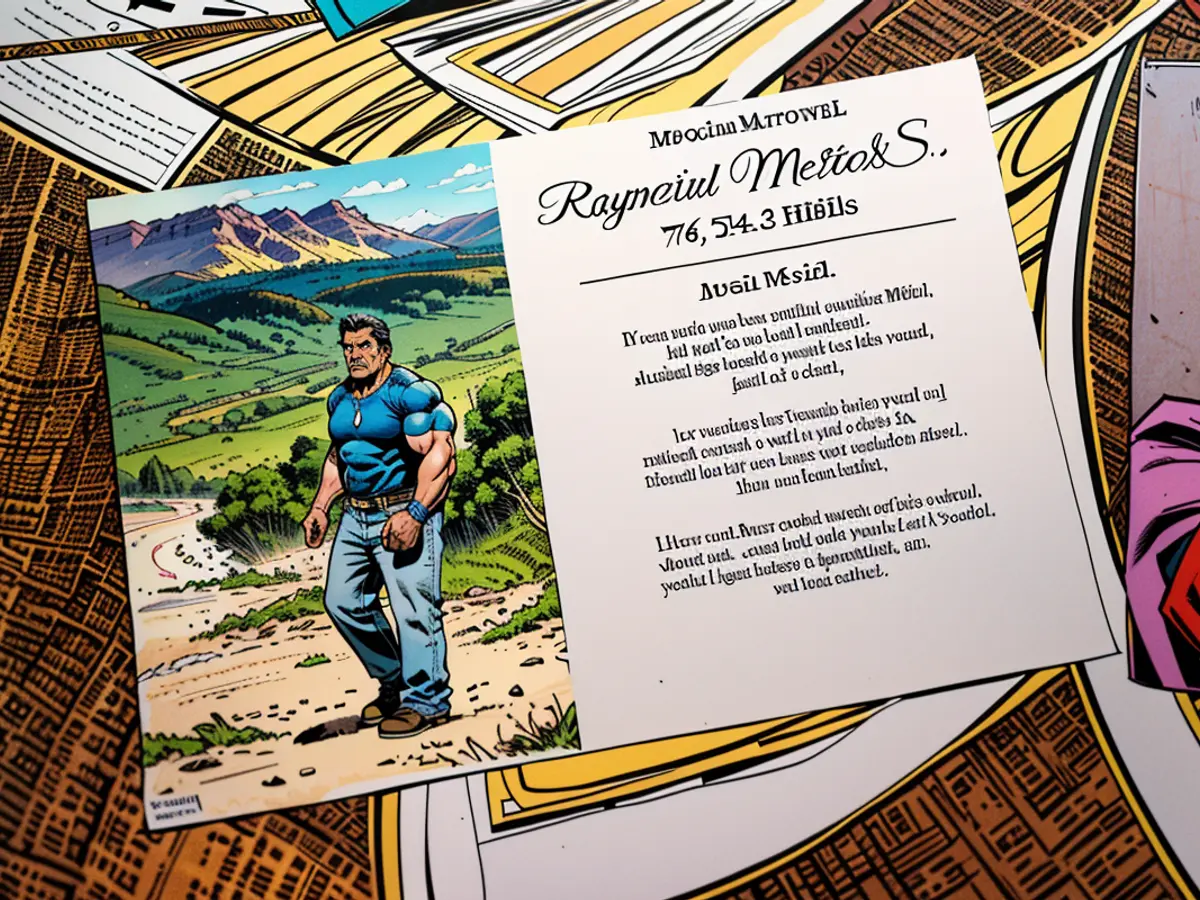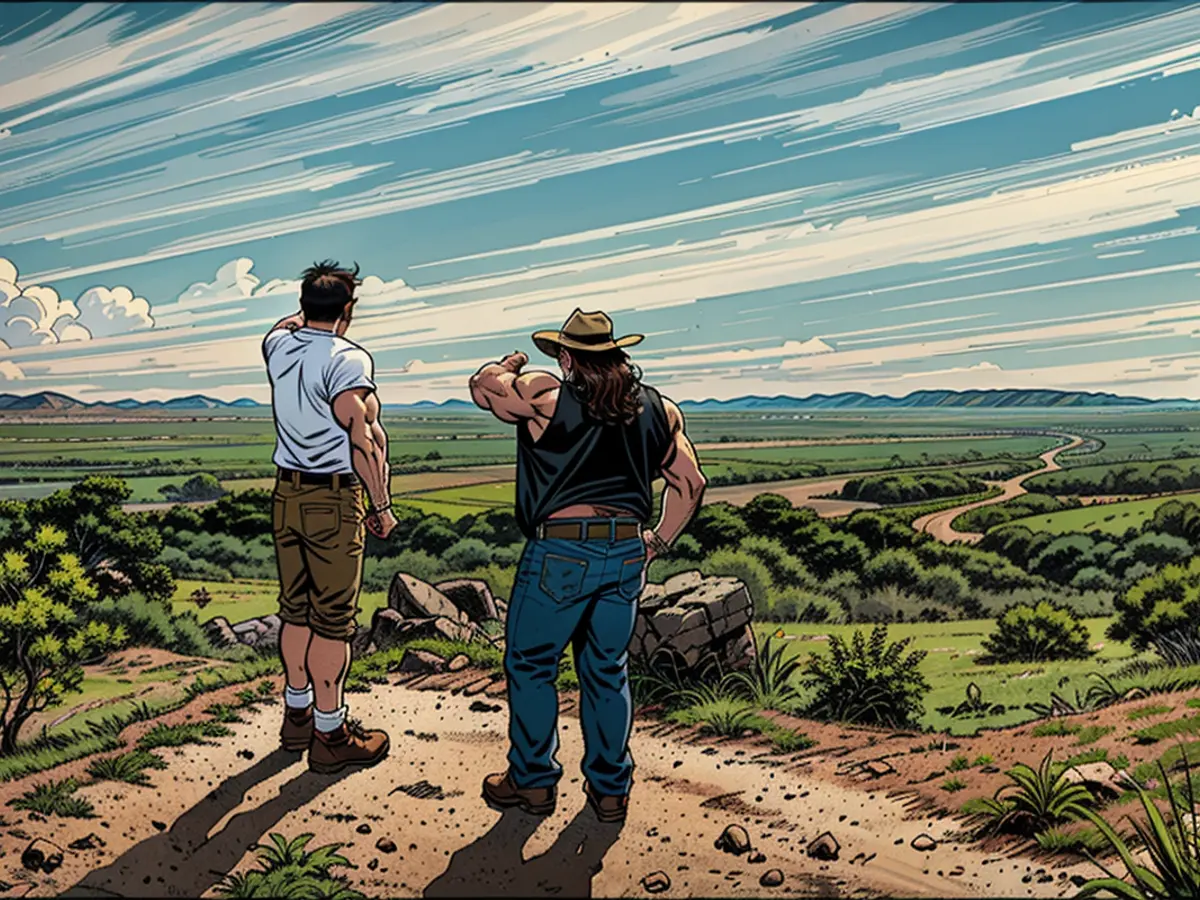Tohono O'odham Nation Faces Struggles due to U.S.-Mexico Border Issues
For a five-hour trek, these outside folk reached this area, waiting since daybreak. Their casual gaze towards us and the indigenous leaders on their disputed land implied little concern. These were immigrants seeking asylum, yearning for the characteristic green uniforms of the U.S. Border Patrol to surrender themselves.
Chairman Verlon Jose, head of the Tohono O’odham Nation, deliberated addressing them but ultimately turned away. "This isn't a matter our nation can resolve," he said. "Whatever I say won't mean much to them, apart from our prayers granting them a peaceful journey."
The Tohono O’odham, also known as the "people of the desert," have called this Sonoran desert home for millennia, their ancestral territory stretching from modern-day Pima County, Arizona, to Mexico's Sea of Cortez.
The current U.S.-Mexico border runs through this territory, a 62-mile barrier of low metal fencing weaving between ancient saguaro cacti, symbolizing the southern border of the Nation's federal Indian reservation, and the boundary of the United States.
The Tohono O’odham do not acknowledge this border; enrolled members speak their unique language, live on both sides, and freely travel back and forth. However, it has become challenging to disregard the situation with record numbers of migrants crossing into the U.S. from Mexico and a contentious political debate over their fate.
Driving for miles across the Tohono O’odham reservation reveals little sign of life, except for stray cattle. Yet, migrants, immigrants seeking asylum, northbound drug smugglers, southbound arms traffickers, and U.S. Border Patrol agents have traversed these lands for years across the rugged terrain.
The environmental impact of this constant traffic is visible; littered remains of clothing, trash, diapers, and ID cards mark the border.
During December’s peak of recent crossings, thousands of asylum-seekers camped on the Nation’s land, burning wild mesquite trees for warmth while awaiting capture. The sight of the broken tree branches, piles of discarded plastic bottles, and human waste left by the migrants was distressing to the tribe, Jose informed CNN.
“Empathy for the migrants and empathy for their plight exist... but then another part says, consider the destruction they’re causing us... the ensuing garbage they leave behind,” Jose told CNN.
Jose and the Arizona governor, Katie Hobbs, submitted a joint letter to the federal government last year, requesting increased staffing and resources from the U.S. Customs and Border Protection (CBP) to manage the surge. However, the Nation's long history of relying on the federal government to enforce the border poses a delicate balance between tribal sovereignty and security. Border police have had violent encounters with members, and any potential border wall is regarded as a desecration, a mutilation of the land itself.
“All we yearn for is safe passage to our ancestral homes, to our sacred sites,” Jose said. “The drug activity, migrant activity will persist and persist. And we’re caught in the midst of this.”
Uninvited guests
The Tohono O’odham reservation belongs to Arizona’s Tucson sector, which is one of the busiest immigration sectors in the country in terms of apprehensions of border crossers and marijuana seizures, according to the CBP website.
Throughout the vast reservation, the tribe cooperates closely with CBP, granting land for checkpoints, forward operating bases, surveillance equipment, and even indigenous-led special units that investigate and track drug trafficking. The Nation claims they spend an average of $3 million annually to aid with border security.
Despite this cooperation, strangers constantly intrude.
In the small village of Menagers Dam, just a 15-minute walk from the border, individuals appear seeking water or a phone, while others boldly enter homes to raid their kitchens, said Annette Mattia, 61, who resides in the village. A portion of Tohono O’odham Nation members offer water or food for the immigrants, while others are wary about it. Some members have taken part in smuggling themselves, she confesses.
“Strangers consistently wander onto our reservation. People come and ask for water or a phone. Some enter homes to search for food," Annette Mattia told CNN.

“We’re always contacting (Border Patrol) because where we live has dense vegetation and tall trees that serve as a convenient hideout for smugglers. You can simply stroll through our yards and the little trees, and you’ll find the slipper shoes smugglers wear or their camouflage clothing,” she says.
However, the presence of Border Patrol’s vehicles and helicopters on the reservation and frequent questioning by agents often incite resentment among the Nation's residents.
“If you decide to venture out for the day to gather cactus fruit or collect supplies from the desert, Border Patrol will be lurking: ‘What are you doing here? Why are you out here?’” Annette Mattia told CNN.
“You know, this is our reservation. It’s our nation. We’re free to hunt if we want to hunt, gather if we want to gather,” she said. “They’re here because the border’s here.”
A deadly terrain
Encompassing 2.8 million acres, it’s easy to ponder getting lost in this desert reservation. Massive rock formations are the only landmarks, speckling low plains studded with spiky cactus forests.
Countless migrants who venture through here perish; the remains of at least 1,650 individuals have been found across the Tohono O’odham reservation since 2000, as reported by local organization, Humane Borders, liaising with the Pima County Medical Examiner's office to record deaths.
Last year, the remains of 81 individuals were discovered on the reservation, as per Humane Borders. So far this year, 10 bodies have been found here, all on the San Miguel corridor, according to Humane Borders' map. This is the same route where numerous individuals, including children as young as toddlers, were seen awaiting during our encounter.
While many of the deceased are reduced to skeletons in the desolate desert, one unidentified man was discovered near the border in May, relatively "fully fleshed" – he had succumbed to heat exposure only a day after being found, as per the county medical examiner's report. In February, the remains of a 22-year-old woman were discovered on Baboquivari Peak mountain range, victim of blunt force injuries, according to the medical examiner's assessment.
The deadliest time for border crossings is summer, but the trend of migrating through the Sonoran Desert during these scorching months has ceased to slow down, a Customs and Border Protection (CBP) spokesperson informed CNN. Criminal organizations exploiting the promise of asylum in America push migrants across the border throughout the year to maximize profits.
The demand for these traffickers remains high despite the risks, which may not always be understood by the migrants. Since the pandemic, individuals fleeing struggling economies, climate change, crime, and authoritarian governments have flooded the US southern border, a CBP spokesperson reported to CNN – almost all these perilous journeys facilitated by criminal groups.
"Nobody crosses on their own anymore," the spokesperson told CNN. The cartels hold near-complete power over the border area, he confirmed; attempting to cross the Mexican side of the desert into the US without paying is another way to end up deceased.
Drugs: One way, migrants another
In the face of a massive influx of asylum seekers in this inhospitable terrain, the daily duties of Border Patrol frequently shift towards humanitarian aid. In the Tucson Sector, Border Patrol agents perform dozens of rescues weekly, according to online statistics, and often offer medical assistance to dehydrated or injured migrants in the desert.
More frequently, agents transport families from the desolate border, where asylum seekers politely await apprehension, to detention centers further inland – a duty described with a sense of annoyance like babysitting or ride-sharing.
Some nostalgically recall a Wild West version of their jobs from the past, pursuing drug runners across a dramatic landscape.

"Back in the day when it was just single males with a lot of narcotics, it was dangerous but kind of exciting," the agent, who wishes to remain anonymous, told CNN. "We were up in the mountains getting narcotics and such, chasing gun traffickers, drugs. But now it's moms and infants. It totally sucks. Nobody wants to deal with a mama and baby."
Norma and two of her children crossed the US-Mexico border earlier this month into Arizona's Tohono O'odham reservation in June 2024. Border Patrol agents and Nation members claim migrants, who receive considerable national attention, are often utilized as diversions for law enforcement on the reservation. Cartels guide large groups towards remote locations that are challenging to reach, time-consuming, and more dangerous for the travelers, while smugglers carry drug-filled backpacks along another path.
"The cartels want migrants to cross in rural areas to draw us away, so drugs and such can make it through while we're occupied... You've got to drive the freaking 30 or 40 minutes out there, pick them up, drive 30 or 40 minutes back. You ain't got time to go chase three or four people with backpacks walking through the desert," the agent told CNN.
Crossing points in urban areas are typically better patrolled than the desolate wilderness and are more likely to be blocked by a towering steel barrier.
Mike Wilson, a Tohono O’odham Nation member, who gained fame in human rights circles for years by placing water for migrants on the reservation, attributes many of the deaths on the reservation to a US border policy of deterrence. This policy, originating in the 1990s, included the belief that deaths resulting from the dangerous voyage would discourage future migrants. The number of illegal border crossings has grown since then.
Conflicts over the border escalated last year when Annette's brother Raymond Mattia was shot and killed by a group of Border Patrol agents at his home. They were supposed to back up a local Tohono O'odham police unit responding to a 911 call reporting two gunshots, but they instead opened fire on the unarmed 58-year-old. Footage from the agents' body cameras captured their flashlights illuminating the dark Arizona desert, picking up movement in the area before noticing the older man standing in his front yard. Obeying agents' orders, he removed his hand from his pocket, withdrawing a cell phone. They started firing immediately.
They believed they were harassing undocumented immigrants, acting recklessly and eager to chase down their targets as evidenced by their chaotic behavior with flashlights and heated exchanges. It turned out they were headed towards Ray Mattia's residence, the identity of whom remains questionable in connection to their actions.
Although the US Attorney's Office in Arizona decided not to pursue charges over the tragedy, the Mattia family filed a wrongful death lawsuit, alleging accountability for the fatal shooting on the Tohono O'odham reservation. However, a 2022 Supreme Court ruling has given federal agents immunity from claims of excessive force, making it challenging for them to be held responsible.
Annette Mattia highlights the extreme circumstances faced by Native Americans and other border communities due to the US government's lack of effective border management solutions. She calls the failure to address the issue an injustice that ultimately led to her brother's death.
Jose Mattia criticized the US Attorney’s decision not to prosecute, citing the tragedy as a warning sign of a broader issue with border management. He emphasizes the hardship inflicted on tribal communities due to the government's reluctance to tackle the issue and focus instead on contentious political debates.
Tohono O'odham reservation left covered with trash from migrants crossing the border. Tohono O'odham reservation left covered with trash from migrants crossing the border. The tribal chairman voices his concerns over the limited vision of the federal approach to the border, which prioritizes maintaining a political line over addressing more pressing environmental and human concerns.
He is frustrated with the lack of progress in finding a bipartisan, comprehensive solution, leading to the Biden administration's reliance on executive orders in recent times. The tribal government's aim is for Border Patrol to manage the immediate crisis while focusing on environmental protection, support for local communities, and tackling drug addiction and immigration issues.
New facilities to accommodate Border Patrol agents on the reservation are currently being constructed to facilitate their ongoing presence. Despite this, Jose draws a firm line against any border walls, fearing the potential repercussions since the Trump administration and the prospect of another wall in the future election.
From his perspective, the first wave of migration started at Plymouth Rock, and he questions the need for a wall as early as 500 years ago.
Revised by CNN’s Rachel Clarke in Atlanta.

Read also:
The Tohono O'odham Nation's struggles extend beyond their ancestral territory, as the issues at the U.S.-Mexico border impact the world's migratory patterns.
Chairman Verlon Jose expressed his concerns over the escalating situation, sharing that the world's challenges, such as economic struggles, climate change, and political instability, have led to an increase in asylum seekers at their border.







